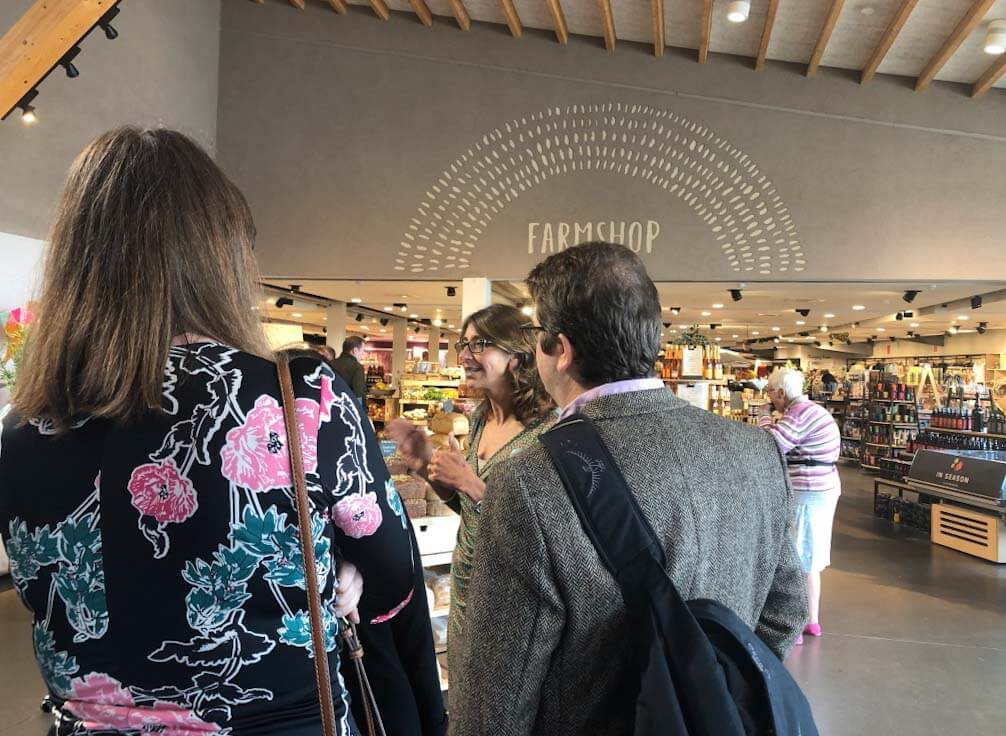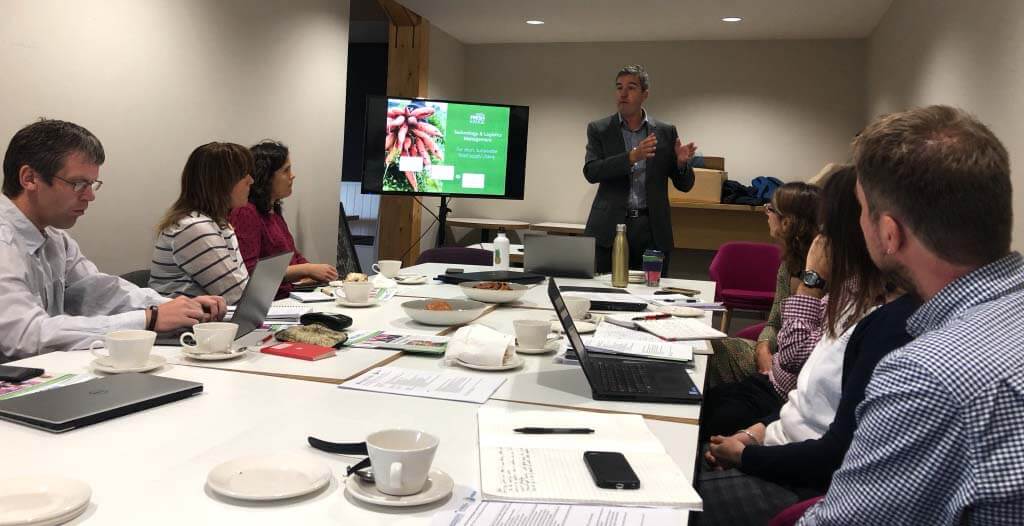Sustainable food goes to the motorway
Thu 24 Oct 2019
A motorway service stop is a strange place for a meeting about sustainable food. But, in September, representatives from ROBUST’s Gloucestershire and Mid Wales Living Labs pulled off the road, and sat down to share good food and grand ideas. Why did we meet on the motorway – and what did we learn?

How a motorway services became uniquely rural-urban
In the UK, most motorway service stops offer travellers the usual big fast food chains. But Gloucester Services – which hosted our meeting – is different. The story starts in 1972, up in Cumbria, where a local farming family faced the prospect of a motorway cutting through their land. They took the development as an opportunity, and built a roadside stop offering homecooked meals made with fresh farm produce. In 2014, the family business came to Gloucester.
Gloucester Services north- and south-bound stops are in purpose-designed timbered buildings, with turf rooves that blend into the rolling rural landscape. Inside, a busy restaurant serves a seasonal menu, prepared in on-site kitchens. The farm shop next door sells bread, meat, specialty cheeses and more, sourced from over 130 producers within 30 miles.

Even more uniquely, the business partners with a charity, the Gloucestershire Gateway Trust. A percentage of the sales support the Trust’s work in the wider community. And, the kitchens and restaurant employ young people from Gloucester’s most deprived areas and train them in a range of jobs, from apprentice butchers to skilled cooks.
Gloucester Services is a real example of mutually beneficial rural-urban connections in action. The motorway proved the perfect place to bring together two of the Living Labs – Gloucestershire and Mid Wales – from ROBUST’s Sustainable Food Systems community of practice.
Sharing across the border
The Gloucestershire Living Lab, in England, includes researchers from the Countryside and Community Research Institute (CCRI) and regional development practitioners from Gloucestershire County Council. The big question for the Lab is: How viable is a Circular Economy model of growth and prosperity in Gloucestershire? Sustainable food is part of the answer, and the Lab team is looking specifically at how public sector food procurement can be a model for reducing waste and emissions, and putting more local food on public plates.
For the Mid Wales Living Lab – a partnership between Aberystwyth University and the Welsh Local Government Association – the challenge is doing regional development without urban centres. The Lab works across the nine local authorities in Wales that are predominantly rural. Monmouthshire is one of these; the county council was recently part of URBACT’s Agri-Urban project, and momentum is building to turn existing sustainable food initiatives into a county-wide approach.
Gloucestershire and Monmouthshire make an especially interesting comparison because they are near to each other and share similar geographies – but they’re also in different countries. Although both England and Wales are part of the UK, Wales has had a devolved government for twenty years. Since one of the issues we explore in ROBUST is how different governance arrangements can help or hinder rural-urban relations, the England-Wales border makes for unique lab conditions.
Putting sustainable food into practice
ROBUST’s Sustainable Food Systems community of practice responds to increasing awareness about the social, cultural, economic, health and environmental side-effects of globalised food chains. Together, we ask: how can regional food policies help to reshape rural-urban connections? What positive links can be made to other policy areas, like public health, social equity, and regional development?
To help us think through these ideas, members of the two Living Labs were joined by a range of speakers. Tamsyn from BoomCircle told us about her role in developing the new Gloucestershire food strategy. Andy and Clare from Gloucester Services took us through the organisation’s unique business model and approach to sourcing local food. Rich from FreshRange helped us understand how a tech company can connect small producers to big institutions. Creating truly sustainable food systems, these examples reminded us, means doing business differently.

After so much inspiration, and plenty of enthusiastic discussion, we were ready for lunch – and a visit to the farm shop, too. Besides bulging shopping bags, we took away a lot to chew on.
Our takeaways
A sustainable food system is as much about the way we eat as the way we grow. Local and regional food strategies are a valuable tool for identifying the gaps and challenges in the existing system, and helping councils and stakeholders set priorities to work towards change. While we know that good food matters for health and wellbeing, we also need to think about who has access to healthy food, and who does not. Food strategies matter for social justice.
Public plates also matter for sustainable food. Public sector food procurement – including, for example, the food for schools and hospitals – can help widen access to fresh food, and provide a valuable market to local growers. But, the current high-volume contracting system makes it very difficult for small growers to become suppliers, or to support local provenance and seasonality. A dynamic procurement system, using logistics algorithms, has real potential for solving these challenges.
Pulling off the motorway helped us re-imagine rural-urban relations. Gloucester Services changes the model of how motorway stops can be done – and that gave us the space for thinking about how food systems can be done differently, too.


